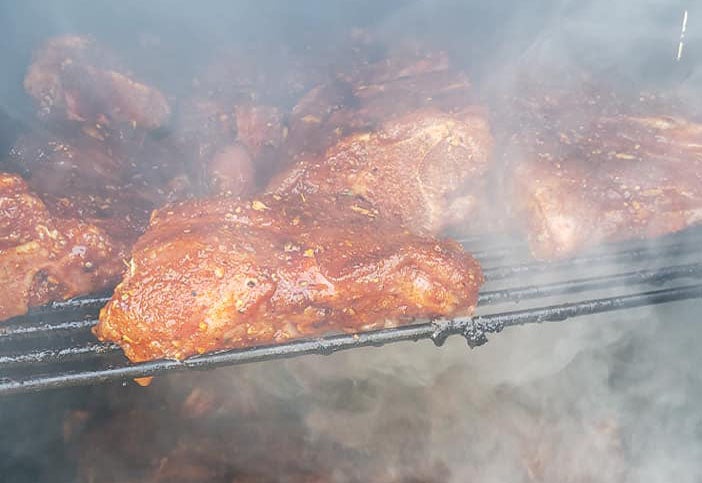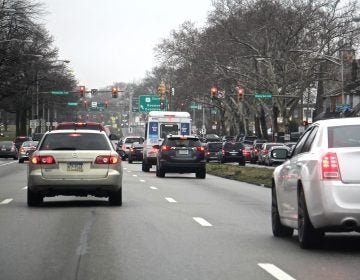What my beef with meat smoking taught me about being a good neighbor
The rise of backyard meat smokers demands new etiquette in a crowded city.

(James Russell Turner/Facebook)
I probably wouldn’t have expected my neighbor to tell me before he started smoking meat. But since he didn’t, I hurtled out of bed at 7 a.m. one summer Wednesday thinking my rented South Philly rowhouse was on fire. The alarming smell thickened near the windows, open to catch the cool night air.
Then I spotted the smoke. It was billowing from the patio of the neighbor directly behind me.
With the blessing of countless new cookbooks, we’ve decided that Pa Ingalls was onto something and we’re smoking our own meat right outside the house. The problem with our rugged culinary panache is that this isn’t the Big Woods of Wisconsin. Our neighbors aren’t a day’s wagon-ride away. They’re just on the other side of a six-foot-high cinder-block wall.
A comprehensive guide for home meat-smoking says “it’s imperative that you allow for the smoke to escape and move around.” The guide doesn’t mention where all that escaping smoke is going — an important point for city-dwellers.
We endured five hours of the smoke before my roommate looked over the back alley and politely asked our neighbor how much longer he would be cooking.
“Why?” our neighbor questioned.
“Our house is full of your smoke.”
“It’ll be a couple more hours.” Those were his final words on the matter.
Maybe you sympathize with my neighbor, who might’ve been cooking for a special occasion. Meat-smoking can be an important part of a festive meal in many of the diverse cultures that thrive in Philly. As with many aspects of urban living, understanding and patience are a good first line of thought.
But I’m not the only one who’s concerned about smoke and the city. Pennsylvania and Philadelphia law ban all tobacco smoking (and vaping) in the vast majority of public indoor areas and any private residence that’s a day-care facility for children or adults. You’re also not allowed to smoke within 20 feet of any entrance to a public non-smoking building.
My neighbor’s set-up probably isn’t more than 20 feet from my back door, but his smoke is legal.
I’m not caring professionally for any kids or adults in my house, but perhaps other neighbors are. Even with the windows shut, the sun shining between my living-room curtains made a hazy slice of gold in the smoky air. My dog hid under the table and sneezed explosively.
I know city living. When my neighbors on the north side lights a cigarette at their back door, I smell it in the shower. The bearded biker right across the street sometimes fires up his Harley before 8 a.m., its engine booming off the close brick walls. One night, when my partner stopped his car outside our house so we could take my roommate to the ER, the lady across the road scolded him for blocking the street.
But sometimes I come home to a note on my door, after neighbors notice an unattended package and bring it into their own house for safekeeping. Two families unknowingly took in the same cat after it repeatedly wandered away from a third. Summer evenings become impromptu block parties with a cone in the street, and trikes and kiddie pools and chalk and beer and folding chairs. After a woman across the street died, most of our block turned up at the funeral on a rainy Tuesday morning. The family across the way adopted her dog. “If you ever need anything,” she used to tell me, “knock on my door.”
I work from home, so I see my neighbors a lot, for better or worse. And for me, in my home office, a backyard-smoked brisket is definitely for worse.
When I complained about it online (as one does), many sympathized. “For better or worse, I think this is a thing now,” someone offered. But the conversation quickly became more contentious.
“Sounds like it might be time to move to the burbs,” someone said. Maybe she’s right — but other factors aside, why not turn that question on folks devoted to meat-smoking?
A city friend who loves his smoker asked why I was complaining about this after I chose to live in a dense urban area. He suggested, as a “compromise,” I leave my house for the day (maybe hit a museum?) if someone else was cooking. He hopes I’m not starting “some gentrifying petition.”
No, I’m not collecting signatures. But it’s worth pointing out that it’s not fair to expect your neighbors to clear out for the day if you’re doing something that severely impacts their home environment.
One thing I notice, walking around town, are stickers on doors and windows warning that oxygen is in use in that house (i.e., don’t light up anywhere nearby). Philly also has about 246,000 residents who identify as having a disability.
That’s 16% of all Philadelphians — by far the highest rate among America’s top 10 largest cities (the nationwide average is 12.5 percent). And as long as we’re talking about houses full of smoke, let’s remember that the Census Bureau defines disability, in part, as something that can “impede a person from being able to go outside the home or to work at a job.”
I myself live with painful chronic illness that limits my mobility. Besides being unable to leave the house on some days, I have heightened sensitivity to environmental factors like smoke. Other folks may have different challenges — maybe they don’t have the budget to head out, maybe they’re elderly, or maybe they’re caring for young children. I’d ask meat-smokers to consider this, and ideally, get to know their neighbors well enough to realize who might be affected.
Many city-dwelling meat smokers already minimize their impact, or gain goodwill with an offering of the delicious smoky spoils next door — a generous way to make the project more agreeable to everyone.
The more neighbors you have, the more neighborliness you need — if you’re not going to drive everyone up the walls, you share. In the end, it’s not just about smoking meat. It’s a taste of how we serve ourselves — and the city we all live in together.
WHYY is your source for fact-based, in-depth journalism and information. As a nonprofit organization, we rely on financial support from readers like you. Please give today.







